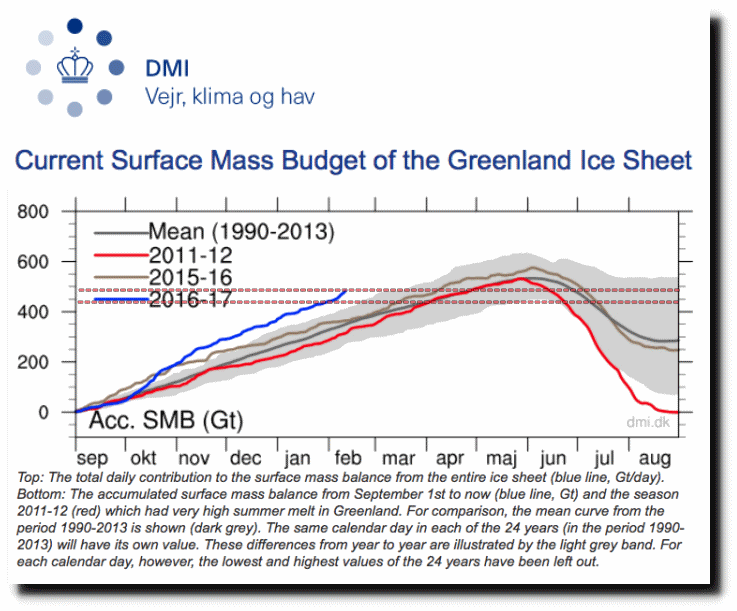Just as the warming Arctic has led to cold storms on the East Coast, there has been a slowdown of the MOC, and that could lead to colder Atlantic coast temperatures even as the rest of the continent rapidly warmed. Interesting to speculate what the results of that colder coast and warmer interior would be for tornado alley.
Barrow, -17F
Alert -33F
Kotelny -2F
and completing the 4 cardinal point tour around the Arctic:
Golomjannyj Is -11F
Arctic Weather Map
Arctic Sea Ice News and Analysis | Sea ice data updated daily with one-day lag
March 6, 2017
Another warm month in the Arctic
High air temperatures observed over the Barents and Kara Seas for much of this past winter moderated in February. Overall, the Arctic remained warmer than average and sea ice extent remained at record low levels.
Arctic sea ice extent for February 2017 averaged 14.28 million square kilometers (5.51 million square miles), the lowest February extent in the 38-year satellite record. This is 40,000 square kilometers (15,400 square miles) below February 2016, the previous lowest extent for the month, and 1.18 million square kilometers (455,600 square miles) below the February 1981 to 2010 long term average.
..............................................................................................................................
Air temperatures at the 925 hPa level (approximately 2,500 feet above sea level) remained 2 to 5 degrees Celsius (4 to 9 degrees Fahrenheit) above average over the Arctic Ocean. The high air temperatures observed over the Barents and Kara Seas for much of this past winter moderated in February. February air temperatures over the Barents Sea ranged between 4 to 5 degrees Celsius (8 to 9 degrees Fahrenheit) above average, compared to 7 degrees Celsius (13 degrees Fahrenheit) above average in January. Recall that these January temperature extremes were associated with a series of strong cyclones entering the Arctic Ocean from the North Atlantic, drawing in warm air. Sea level pressure in February was nevertheless lower than average over much of the Arctic Ocean. Sea level pressure was higher than average over the Bering Sea and just north of Scandinavia.
Antarctic minimum extent
Antarctic sea ice is nearing its annual minimum extent and continues to track at record low levels for this time of year. On February 13, Antarctic sea ice extent dropped to 2.29 million square kilometers (884,000 square miles), setting a record lowest extent in the satellite era. The previous lowest extent occurred on February 27, 1997. By the end of February, extent had dropped even further to 2.13 million square kilometers (822,400 square miles). The record lows are not surprising, given Antarctic sea ice extent’s high variability. Just a few years back, extent in the region set record highs (Figure 4b).




